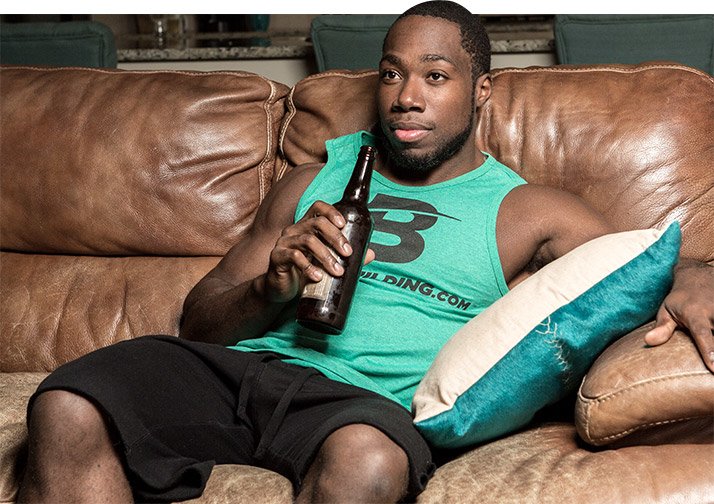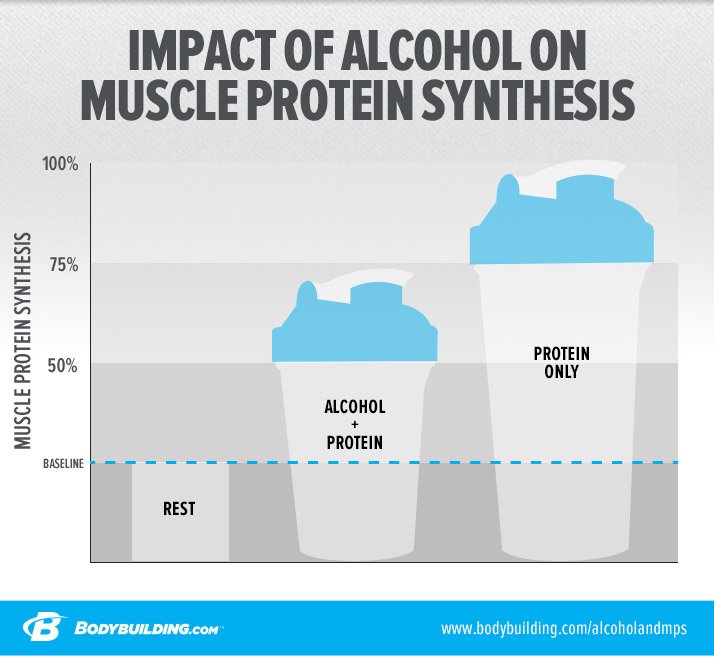[h=1]Ask The Nutrition Tactician: How Does Alcohol Affect Muscle Growth?[/h]
By Paul Salter, MS, RD
Last updated: Mar 17, 2016
Q[h=3]HOW DOES CONSUMING ALCOHOL POST-WORKOUT IMPACT MUSCLE GROWTH?[/h]
Whether you're chasing an arm pump before a night on the town or squeezing in a quick workout before a date, it's not uncommon to indulge in a drink shortly after training. Even if you think you can handle the extra calories because you're "on a dirty bulk," consuming alcohol has a bigger impact on your physique beyond basic calorie balance.
I recently wrote about the impact of drinking alcohol while trying to lose fat, but it's worth discussing the opposite end of the spectrum—how alcohol affects muscle growth and recovery—for everyone out there trying to get bigger.
Alcohol itself can actually derail your ability to build muscle, at least in the short term. How? That conversation begins with understanding how you build muscle over time, or the relationship between muscle protein synthesis (MPS) and muscle protein breakdown (MPB). The first process builds muscle mass, while the second tears it down. Our bodies are constantly building and breaking down protein throughout the day, a process known as protein turnover.
[COLOR=#FFFFFF !important][FONT=ProximaNovaExCn !important]IT'S THE NET BALANCE BETWEEN MUSCLE PROTEIN SYNTHESIS AND MUSCLE PROTEIN BREAKDOWN THAT DETERMINES WHETHER YOU BUILD MUSCLE.
It's the net balance between MPS and MPB that determines the fate of your existing and potential muscle mass. Although the change in protein turnover is continuous, the long-term net balance dictates muscle growth or breakdown. If your body is constantly breaking down more muscle than it's building, you clearly won't be putting on muscle any time soon.
Alcohol reduces muscle growth by suppressing MPS, which shifts the net balance in favor of muscle breakdown. When consumed post-workout, these negative effects are amplified. This is because your workout itself is catabolic, greatly increasing MPB, especially the longer you go. Having a drink after training decreases MPS and further increases MPB. This catabolic cocktail is not a recipe you should try often if muscle growth is your goal.
 [COLOR=#FFFFFF !important][FONT=ProximaNovaExCn !important]EXERCISE INCREASES MUSCLE PROTEIN BREAKDOWN; ALCOHOL DECREASES MUSCLE PROTEIN SYNTHESIS.[/FONT][/COLOR]
[COLOR=#FFFFFF !important][FONT=ProximaNovaExCn !important]EXERCISE INCREASES MUSCLE PROTEIN BREAKDOWN; ALCOHOL DECREASES MUSCLE PROTEIN SYNTHESIS.[/FONT][/COLOR]
[h=3]WHAT ABOUT A VODKA PROTEIN SHAKE?[/h]It may seem plausible to think that consuming protein in a post-workout beverage will minimize, if not completely negate, the detrimental changes alcohol imposes on your muscle-building efforts. Unfortunately, the damage is already done.
A 2014 study published in PLOS One had subjects consume one of the following combinations immediately after their workout (as well as four hours later): whey protein only, whey protein and alcohol, or carbohydrates and alcohol.1 Protein turnover was measured two hours and eight hours post-workout.
 [COLOR=#FFFFFF !important][FONT=ProximaNovaExCn !important]IMPACT OF STUDY GROUPS ON MUSCLE PROTEIN SYNTHESIS.[/FONT][/COLOR]
[COLOR=#FFFFFF !important][FONT=ProximaNovaExCn !important]IMPACT OF STUDY GROUPS ON MUSCLE PROTEIN SYNTHESIS.[/FONT][/COLOR]
As you'd expect, alcohol suppressed MPS. What was interesting, however, was that even when whey protein was added to the alcohol group, rates of MPS were still reduced by 24 percent compared to the protein-only group. This is clear evidence that alcohol and protein don't mix post-workout, and that even the anabolic properties of whey aren't enough to override the detrimental effects of alcohol.
[h=3]PRACTICAL RECOMMENDATIONS[/h]To mitigate the negative effects of alcohol on your hard-earned gains, try working out in the morning or otherwise putting as many hours—and protein-rich meals—between your training sessions and your social hour as possible. A 24 percent reduction in MPS once or twice per week may seem insignificant, but trust me: As muscle growth becomes even more challenging over time, you'll want every single percent you can get!
[h=5]REFERENCES[/h]
[/FONT][/COLOR]
By Paul Salter, MS, RD
Last updated: Mar 17, 2016
Q[h=3]HOW DOES CONSUMING ALCOHOL POST-WORKOUT IMPACT MUSCLE GROWTH?[/h]
Whether you're chasing an arm pump before a night on the town or squeezing in a quick workout before a date, it's not uncommon to indulge in a drink shortly after training. Even if you think you can handle the extra calories because you're "on a dirty bulk," consuming alcohol has a bigger impact on your physique beyond basic calorie balance.
I recently wrote about the impact of drinking alcohol while trying to lose fat, but it's worth discussing the opposite end of the spectrum—how alcohol affects muscle growth and recovery—for everyone out there trying to get bigger.
Alcohol itself can actually derail your ability to build muscle, at least in the short term. How? That conversation begins with understanding how you build muscle over time, or the relationship between muscle protein synthesis (MPS) and muscle protein breakdown (MPB). The first process builds muscle mass, while the second tears it down. Our bodies are constantly building and breaking down protein throughout the day, a process known as protein turnover.
[COLOR=#FFFFFF !important][FONT=ProximaNovaExCn !important]IT'S THE NET BALANCE BETWEEN MUSCLE PROTEIN SYNTHESIS AND MUSCLE PROTEIN BREAKDOWN THAT DETERMINES WHETHER YOU BUILD MUSCLE.
It's the net balance between MPS and MPB that determines the fate of your existing and potential muscle mass. Although the change in protein turnover is continuous, the long-term net balance dictates muscle growth or breakdown. If your body is constantly breaking down more muscle than it's building, you clearly won't be putting on muscle any time soon.
Alcohol reduces muscle growth by suppressing MPS, which shifts the net balance in favor of muscle breakdown. When consumed post-workout, these negative effects are amplified. This is because your workout itself is catabolic, greatly increasing MPB, especially the longer you go. Having a drink after training decreases MPS and further increases MPB. This catabolic cocktail is not a recipe you should try often if muscle growth is your goal.

[h=3]WHAT ABOUT A VODKA PROTEIN SHAKE?[/h]It may seem plausible to think that consuming protein in a post-workout beverage will minimize, if not completely negate, the detrimental changes alcohol imposes on your muscle-building efforts. Unfortunately, the damage is already done.
A 2014 study published in PLOS One had subjects consume one of the following combinations immediately after their workout (as well as four hours later): whey protein only, whey protein and alcohol, or carbohydrates and alcohol.1 Protein turnover was measured two hours and eight hours post-workout.

As you'd expect, alcohol suppressed MPS. What was interesting, however, was that even when whey protein was added to the alcohol group, rates of MPS were still reduced by 24 percent compared to the protein-only group. This is clear evidence that alcohol and protein don't mix post-workout, and that even the anabolic properties of whey aren't enough to override the detrimental effects of alcohol.
[h=3]PRACTICAL RECOMMENDATIONS[/h]To mitigate the negative effects of alcohol on your hard-earned gains, try working out in the morning or otherwise putting as many hours—and protein-rich meals—between your training sessions and your social hour as possible. A 24 percent reduction in MPS once or twice per week may seem insignificant, but trust me: As muscle growth becomes even more challenging over time, you'll want every single percent you can get!
[h=5]REFERENCES[/h]
- Parr, E.B., Camera, D.M., Areta, J.L., Burke, L.M., Phillips, S.M., Hawley, J.A. & Coffey, V.G. (2014). Alcohol Ingestion Impairs Maximal Post-Exercise Rates of Myofibrillar Protein Synthesis following a Single Bout of Concurrent Training. PLOS One, 9(2), 1-9.
[/FONT][/COLOR]




